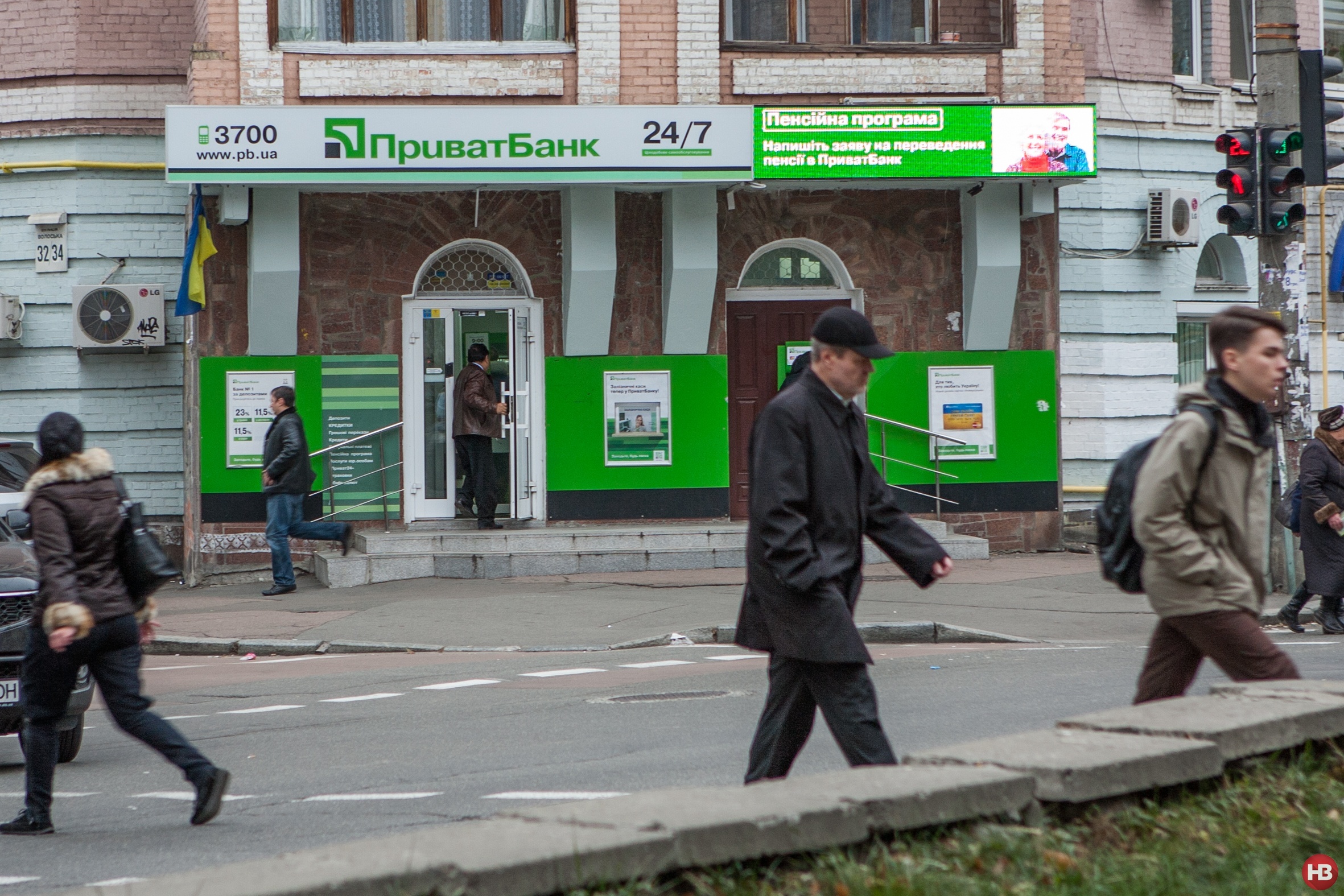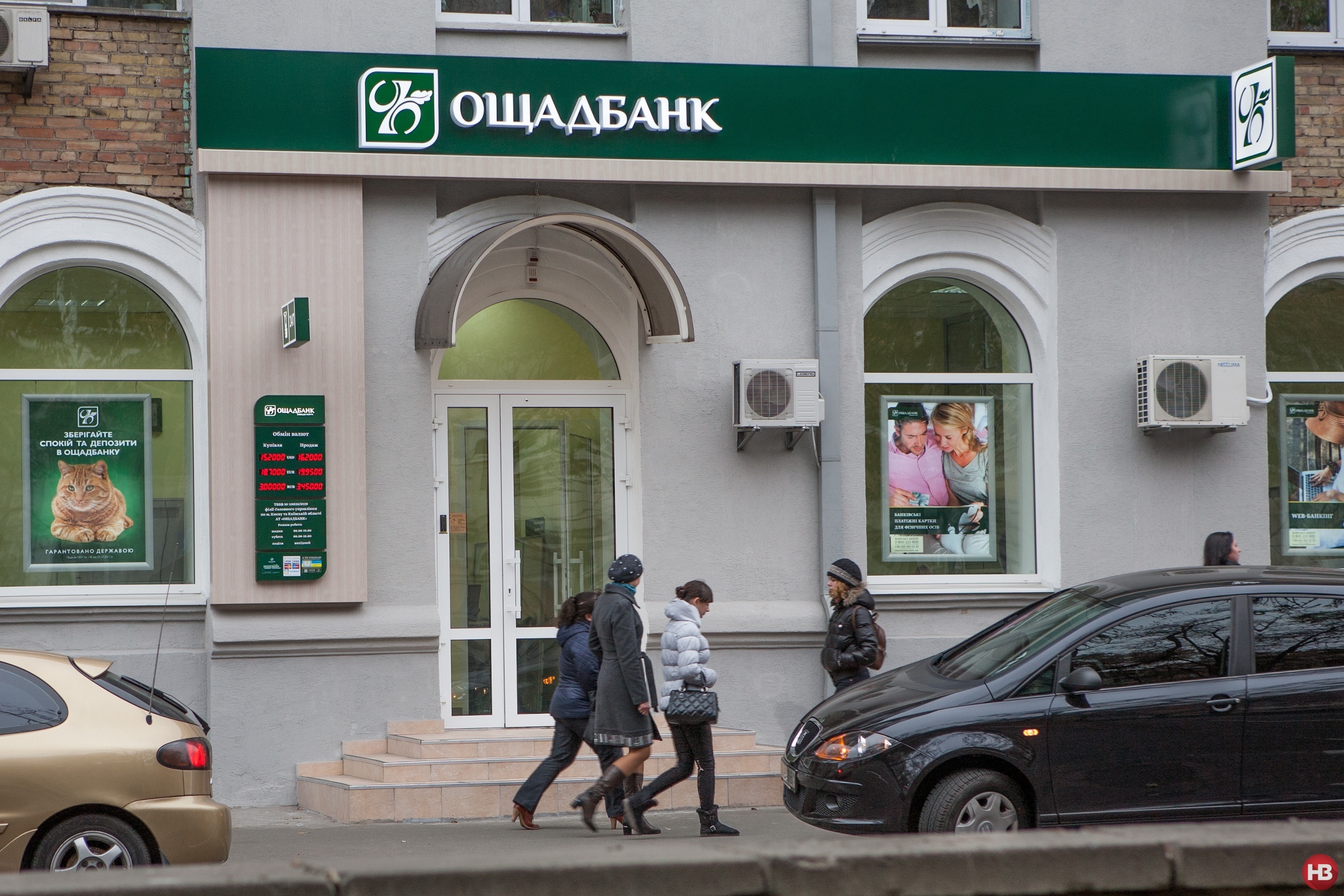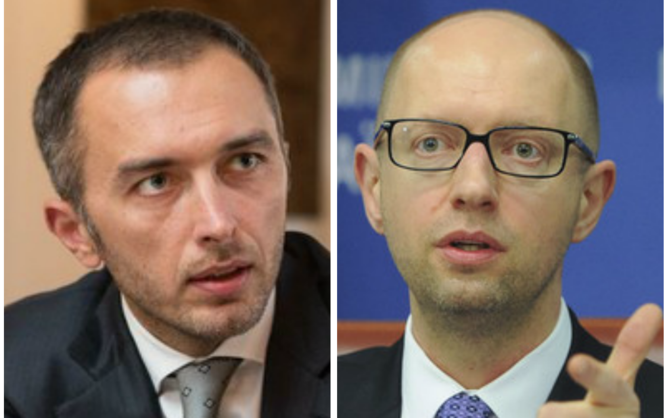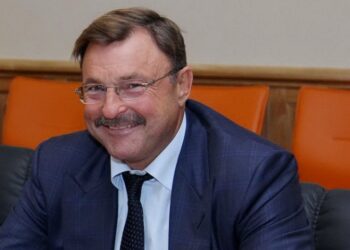The head of Oschadbank Andrey Pyshny (left) and Prime Minister Arseniy Yatsenyuk (right) decided to raise the prestige of Oschadbank in Ukraine
The state-owned Oschadbank challenged the long-term hegemony of Ihor Kolomoisky’s PrivatBank in the retail market. Heavy weapons are involved in the battle on both sides
End of September. The pages of the Ukrainian media are full of articles about the consequences of the defeat of Ukrainian troops near Ilovaisk.
At this time, the then Minister of Defense, General Valery Geletey, joined military operations on a new front for him – banking.
On September 23, the general sends a telegram to the Chief of the General Staff and Commander-in-Chief of the Armed Forces of Ukraine, in which, in the style characteristic of a military man, he orders to “take urgent measures” to implement the Cabinet of Ministers’ decision to transfer ATO participants, and then all employees of the Armed Forces, to state-owned banks.
The telegram stated that if the agreements were not concluded before October 1, the soldiers should be paid in cash. Geletey’s letter became one of the instruments for implementing the Cabinet’s decision, which opened a new front.
The participants in the battle are the largest state financial institution Oschadbank and the largest private financial institution PrivatBank, co-owned by a major businessman and governor of the Dnipropetrovsk region Igor Kolomoisky.
The fight began with a relatively local conflict – salary projects for civil servants – and grew into a full-scale war for market share. Heavy artillery is involved in the conflict on both sides.
Activation of the sleeping giant
Tatyana Frundina, head of the department for promoting services to budgetary organizations of PrivatBank, says that she and her colleagues noticed “activity” immediately after the appointment of the new government.
At the same time, Andrey Pyshny headed Oschadbank (Read more about him: Andrey Pyshny. Yatsenyuk’s godfather and the murderer of Oschadbank)fellow party member and personal friend of Prime Minister Arseniy Yatsenyuk.
“Then we learned from our clients in government agencies that management [страны] Oschadbank is actively promoting,” says Frundina.
By “activity” in PrivatBank we mean administrative pressure on the heads of government departments and companies so that they change the private PrivatBank to the state Oschadbank in terms of servicing their salary projects.
In addition to Geletey’s letter, a brief history of administrative pressure, according to PrivatBank employees, was as follows.
In May, the SBU, represented by its head Valentin Nalyvaichenko, wrote a letter addressed to Yatsenyuk. In it, Nalyvaichenko reported that during 2010–2014, state-owned enterprises and structures were transferred from state institutions for services to private banks.

Bank for the masses: The main competitive advantage of PrivatBank is its wide network and convenient web banking
All this allegedly happened with the active lobbying of representatives of commercial banks, and the clients themselves flowed from state-owned banks to private ones not for economic reasons, but as a result of corrupt agreements.
As a result, entire vital sectors of the country’s economy became dependent on Russian banking institutions and domestic private banks, the letter said.
After this, Yatsenyuk in September instructs several departments at once – the Ministry of Internal Affairs, the Ministry of Defense, the Ministry of Justice, the Security Service of Ukraine, the State Fiscal Service and others – to transfer the salary projects of their employees to state banks for servicing by December 1.
The latter, PrivatBank is sure, means, of course, Oschadbank as the largest state financial institution, which is also headed by an ally and comrade of the prime minister.
And this campaign does not hit the Ukrainian “subsidiaries” of Russian banks, as was stated as the argument for such a step, but rather PrivatBank as the largest holder of salary projects.
According to NV, out of 305 thousand employees of the Ministry of Internal Affairs, 50% receive their salaries through PrivatBank.
The bank’s share in the Ministry of Defense is 56%, in the State Fiscal Service – 94%, and in the State Border Service – 100%. At the same time, Oschadbank’s share in these structures is a modest 4–6%.
Frundina says that the war began with salary projects for security forces, and spread to all civil servants.
Similar stories, according to her, occur in medical institutions, public utilities, and state administrations.
She also emotionally refutes the words of the head of Oschadbank that the government’s work with government agencies is purely advisory in nature.
If they continue what they started, at the end of 2015 we will see another Oschadbank – Andrey Fedorov, owner of fedoriv.com
“If this is not an order, but a recommendation, then why, when it reaches our clients, is it perceived as a direct instruction, and our clients are put under pressure if they do not want to issue Oschadbank cards?” – says Frundina.
But this is only one side of the story.
Fight of opposites
Chairman of the Board of Oschadbank Andrei Pyshny believes that behind Yaroslavna’s crying performed by the management of PrivatBank are the fears of Kolomoisky and Gennady Bogolyubov (Read more about him in the article Gennady Bogolyubov: what is the other half of “Privat” keeping quiet about?) lose close to monopoly positions in the salary projects market.
The real reason for the dissatisfaction of PrivatBank, he continues, is that the post-Soviet dinosaur Oschadbank began to change dramatically and aggressively compete with PrivatBank on all commercial fronts.
Pyshny says that his bank has developed a new development strategy together with the consulting company PricewaterhouseCoopers.
Now it aims to become a successful state-owned bank – a strategy similar to those embodied by the American Bank of America and the Russian Sberbank. In particular, the concept of new branches and the quality of services have been completely changed.
Instead of the usual savings banks, the bank is now building branches with spacious halls, electronic devices for managing queues, children’s corners and coolers with hot and cold water. The bank has opened almost 50 such branches and continues to open two or three a week.
Not much compared to the 5 thousand old-style branches, but this is the beginning, says Pyshny. “Oshchadbank is a bank of millions, and it must become a bank for millions,” he says.

Instead of the usual savings banks, Oschadbank is now building branches with spacious halls, electronic devices for managing queues and children’s corners
Radical changes in the bank will also be carried out by new specialists who have transferred from large institutions with foreign investment.
Salaries and bonuses for senior staff at the state bank were made completely market-like, says Pyshny.
One of the first specialists invited to the bank was the head of the human resources department. He should help select staff and teach existing employees to smile and work in a new way.
Oschadbank considers PrivatBank’s claims that government officials are putting pressure on clients in the interests of state banks to be far-fetched.
According to Andrei Pyshny, employees of his bank simply give presentations to clients, talking about the strengths of the institution, which has not been done before.
In particular, bank employees are now actively conveying to potential clients the thesis of a 100% state guarantee for all deposits and information about the quality of web banking.
Tighter competition began to irritate PrivatBank, continues Pyshny, who involved his extensive media resources in the PR campaign against his bank.
Plans for growth
In any case, Oschadbank will need years and large investments to oust PrivatBank, which has been building its position for years.
Most bank reliability ratings, including a similar list from NV, already place Oschadbank in first place thanks to unlimited state support and a 100% guarantee of deposits by the same state.
However, Oschadbank is significantly inferior to its competitors, primarily PrivatBank, in terms of its ability to work with clients and the scale of its retail business.
According to Oschadbank, the ATM network of this government institution includes only 1.96 thousand ATMs. PrivatBank has almost four times more of them.
The ratio of POS terminals is also not in favor of the government institution – five and a half times less. The number of active payment cards at Oschadbank is seven times less than that of PrivatBank.
Frundina says that Privat has been building his business in the public sector for more than 10 years. “When I started working, we had only 700 thousand payroll clients. Now there are about 3.8 million, 2.9 million of them are in the public sector.”
Capturing a market is not the same as retaining it. But PrivatBank manages to retain it. Bye.
Many clients consider its online and mobile services to be one of the main advantages of Privat.
In order to catch up with its rival, Oschadbank has everything it needs, believes marketing specialist and owner of the feedoriv.com agency Andrei Fedorov, who did a project with Oschadbank this year.
“I know that the bank’s management has strategy, confidence and passion. If they continue what they started, at the end of 2015 we will see another Oschadbank,” says Fedorov.
However, implementing this strategy will take years and significant investments, explains Dragon Capital analyst Anastasia Tuyukova.
Andrey Yukhimenko, material published in issue No. 27 of the magazine “New Time” dated November 14, 2014










